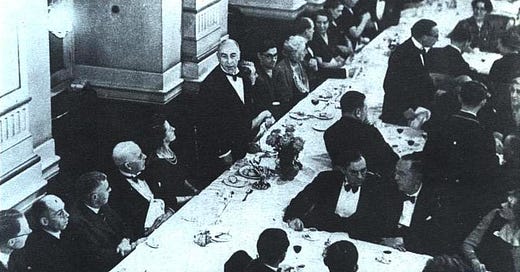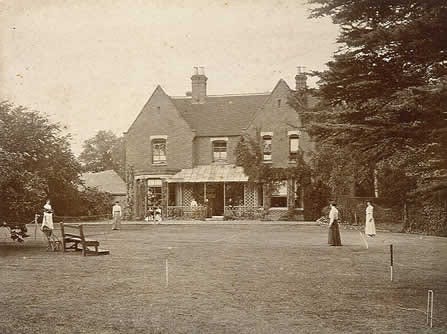Welcome to the maiden voyage of SOURCE NOTES, a new feature where I’ll be gabbing with primo narrative-history authors about the stories behind their stories. First up we have Kate Winkler Dawson, podcaster extraordinaire and author of three page-turning historical true crime bangers, including last year’s ALL THAT IS WICKED. Kate’s latest work, an audiobook called THE GHOST CLUB that you should download right now, is out this week from Penguin Random House. Without further ado…
Let’s start with an overview of THE GHOST CLUB.
This is a story about some of the world's most powerful men who would meet secretly, over French food once a month in London, and they would talk about their work, about books, about their families, their lives, and they would talk about ghosts, and encounters they had with the afterlife. They also talked about how to tell whether a medium was authentic or not, and who was ripping people off. The head of this club for quite a while was the world's most famous ghost hunter, Harry Price. And while he was at the club, he invited members to see what he deemed to be the world's most haunted house. [The Borley Rectory in the East of England.] So it's a braided narrative about the exploration of the Borley Rectory and spiritualism—how this movement swept across America and England, and why it went away.
The Ghost Club’s membership included a number of literary lions and other illustrious men.
There's William Butler Yeats and Arthur Conan Doyle. Harry Houdini was in there. And of course Charles Dickens was one of the earliest members. There was royalty, famous generals, all talking about ghosts they encountered when they were kids, and premonitions, and objects flying all over the place.
How did you get the idea to write about this?
I had come across the Ghost Club reading an article and now I can't even remember what magazine it was in. I thought, okay, this would be interesting. I Googled the Ghost Club and they're still around. I've been to meetings and I started to read about the history. I live in London every year for about six weeks to teach a course in journalism. And so I just thought this was a wonderful opportunity. I don't often talk about what happens after people are dead. I often talk about their death and the reckoning with the killer, and then that's sort of the end of the story. This actually picks up with what happens after people die.
You spent a lot of time in the British Library sifting through decades worth of meeting minutes from 1882 to 1936.
There is a section of material that they will not allow you to photograph. You cannot scan it and you cannot photocopy it. So you are forced to sit there and hand-type everything. It was very difficult. I primarily work in the 1800s, so I'm always grateful to dip into the 1900s when there's typewriters. At the beginning, there was a lot of handwritten notes and some shorthand. But as they became more well known in high society—which is ironic to say about a secretive exclusive club—people started sending in typewritten letters of all these stories, and the stories were read aloud sometimes. The author of the story would come in and present it. So aside from these notes that would talk about, you know, when William Yeats would come to meetings and what he would talk about, there were also these testimonials. I made it through probably 300 stories and there's probably a thousand there. It's incredible.
How long did it take to go through all of that?
So long! I mean, I've been doing this for several years. Ultimately, the one really big question to me was, was this a collusion of true believers in spiritualism, and everybody just fed off of each other and it was delusional? Or was it real? Even though I grew up in what has been called a haunted farmhouse, I've always said, no. But after reading all of this, I just cannot believe that this many people with this level of power would make up these crazy stories. Of predicting the Titanic, of mysterious babies floating out of cribs, of blood spilling down drawing tables. I mean, all of this stuff is wild to hear, especially when it’s a colonel in the British military talking about it with tears streaming down his face.
So every year when you would go to London to teach your journalism course, you’d also do research in this archive at the British Library.
Which is the most beautiful archive I've ever worked in.
What’s it like?
It's massive, cavernous. It's on the second or third floor of the library. And when you walk through the library and go to that floor, it’s like the TSA. They feel you down and make sure you don't have anything bad. You walk by a two or three story sort of faux library full of books in a glass casing, and it's so overwhelming, and you realize the enormity of this place and what must lie within. You go in and there's a huge table, and people with British accents are coming up to you and saying, what do you need? You sit at a table that has a big yellow placard that says ‘no cameras.’ They'll kick you out pretty easily.
Aside from the Ghost Club archive, what other sources did you rely on?
There were obscure scientific articles breaking down the sources of spiritualism, the history of spiritualism. When I went to the Ghost Club, there's a magician there. He was a professor of psychical research, and he was explaining how there were people like Harry Price who were debunking all of these fake mediums, and he was showing us all the tricks. He had written a great book about all of the things that these guys would do, and that was a huge resource for me.
The most cinematic scenes in the audiobook are the ones where Harry Price is at the Borley Rectory doing these spooky investigations. What did you draw on to recreate those?
He had written books about them, and he was very descriptive. He had a flair for narrative, thank goodness. But there were other sources also. There was a reverend who had moved in before that happened, there was a reverend who lived there after Harry Price came, there was a journalist who had been there, and all of these people wrote pretty intense accounts. But it was really meant to be from Harry Price's point of view, because he was the one relaying all of this information to the members of the Ghost Club. He added a lot of legitimacy to a club that did not want publicity. It is mostly true believers. It is people from all walks of life, and it's important for people to feel safe to be able to talk about these things. And back then, just like now, the men were very aware that they would sound like crackpots. So they were incredibly aware that they needed to be protected, and their anonymity needed to be preserved. And that's why you couldn't get into the archive for decades and decades, because it was protected.
When you’re writing about people who are long dead, there’s a level of detachment. At the same time, you’re telling their secrets, and you wonder if these people are rolling over in their graves.
I wrestle with that. Not with this story, because I did not care much about these men who, you know, were very privileged and almost exclusively white, being embarrassed many years later. I am much more concerned when I deal with female murder victims, and their personal lives come up. In AMERICAN SHERLOCK, I accessed the diary of a woman who may or may not have been murdered by her husband, the jury's kind of still out on that. And I was able to look at the diary and it essentially showed no issues, infidelity, anything, just pretty much happiness and content. So on the one hand, it was really good evidence for me to put forward and say, you know, they had a good relationship. On the other hand, this is not something that this woman, under any circumstances, would’ve wanted to be read by, you know, the hundred thousand people who read the book. So it’s really an ethical issue. My saying is, the deader the better! I have a podcast season of TENFOLD MORE WICKED coming up that's from the 1600s.
Was there anything you couldn't get your hands on that you really wanted to?
I wish I had a lot more information on Yeats and his wife. He and his wife were devoted spiritualists. He was a believer. He was very attached to it, and you could just feel the passion in his writing, the connection he felt with the afterlife. I wish that I knew a little more about that. Or I wish I could have read a really good interpretation of what would happen when he and his wife would do a seance or an automatic writing or any of that stuff. Same thing with Conan Doyle.
Wanna tease out what's next from you?
I'm in the middle of my fourth book, but that's not gonna be out for quite a while. The new season of TENFOLD just dropped, and then BURIED BONES is always going. So there's always something with my voice if you wanna hear it.






